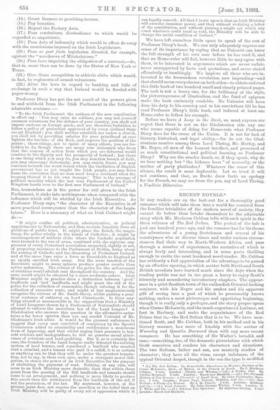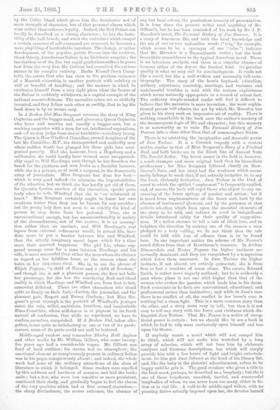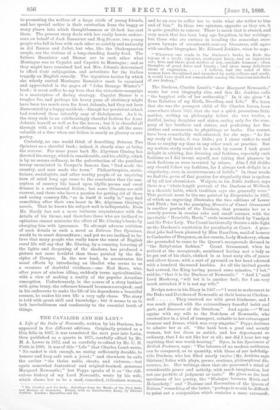RECENT NOVELS.* IF any readers are on the look-out for
a thoroughly good romance which will take them into a world far removed from the familiar trivialities of the modern novel of society, they cannot do better than betake themselves to the admirable story which Mr. Maclaren Cobban tells with such spirit in the three volumes of The Red Sultan. The period of the tale is just one hundred years ago, and the romance has for its theme the adventures of a young Scotchman and several of his countrymen who at diverse times and under various circum- stances find their way to North-Western Africa, and pass through a number of experiences, the narrative of which is always lively and interesting, and in some parts thrilling enough to excite the most hardened novel-reader. Mr. Cobban has evidently a full appreciation of the advantage to be gained by an effective opening, in which matter both North and South British novelists have learned much since the days when the reading public was not in too great a hurry to enjoy Scott's leisurely and meandering introductory chapters. The appear- ance in a quiet Scottish town of the outlandish Oriental-looking conjuror, with his Negro and his snakes and his apparent gift of seeing into a past of which he presumably knows nothing, makes a most picturesque and appetising beginning, though it is really:only a prologue, and the story proper opens when Cosmo McLaurin, and the much-experienced Lorimer, set foot in Barbary, and. make the acquaintance of the Red Prince that is,—the Red Sultan that is to be. We have men- tioned Scott, and Mr. Cobban, both in his method and in his literary manner, has more of kinship with the author of Waverley and Quentin Durward than with any more recent romancer. He has something of Sir Walter's breadth and ease,—something, too, of the dramatic pictorialism with which Scott conceives and renders his characters and situations. The two Sultans, father and eon, are masterly studies of character; they have all the vices, except indolence, ofthe typical Oriental despot, though in the son the type is modified (I..) The Rod Sultan: the Remarkable Adventures in Western Barbary of Sir Cosine MoLaurin, Bart., of Monzio, in the County of Perth. By J. Maclaron Cobban. 3 vols. London : Oluitto and Windus.—(2.1 A Broken Idol, By Adeline Sergeant. 8 vole. London : Hurst and Blaokett.—(3.) The Personal Iliston of Jim Duncan: a Chronicle of Small Beer. By John Pennington Mars- den. 3 vols. London : Kogan Paul, Trench, Trubnor, and 0o.—(4.) Jam Trelear : a Study of a Woman. By J. H. Pearce. 2 vols. London : Methuen and (lo.—(5.) Aunt Johnnie. By John Strange Winter. 2 vols. London : F. v. White and 0o.—(6.) Between Two Opinions. By Algernon Hissing. S vole London: Hurst and Blackett.
by the Celtic blood which gives him the dominance not of mere strength of character, but of that personal charm which wins rather than enforces loyalty. Indeed, the Red Prince can hardly be described as a strong character ; he has the insta- bility of the half-breed; and when the restraints which compel a certain measure of self-command are removed, he becomes a mere plaything of incalculable impulses. The change, or rather development, of the popular, politic Prince into the reckless, blood-thirsty, treacherous Sultan is no histrionic surprise ; the inevitableness of the fine but rapid gradations suffices to prove how from the very first Mr. Cobban had conceived the curious nature in its complex entirety. Basha Kiamil (born Camp- bell), the astute Scot who has risen to the perilous eminence of a Moorish viziership, is another portrait with subtlety as well as breadth of handling; and the manner in which he extricates himself from a very tight place when the favour of the Sultan is suddenly withdrawn, is a capital example of the national resourcefulness. The narrative crises are so skilfully invented, and they follow each other so swiftly, that to lay the book down is by no means easy.
In A Broken Idol Miss Sergeant reverses the story of King Cophetua and the beggar-maid, and gives us a Queen Cophetua who loves and marries not exactly a beggar-man, but a working carpenter with a turn for art, intellectual aspirations, and—if we may judge from one or two hints—a cockney twang. The Queen is Miss Winifred Considine, second daughter of the late Mr. Considine, M.P., the distinguished and unthrifty man whose sudden death has plunged his three girls into semi- genteel poverty. Had she, however, been a Hapsburg and a millionaire, she could hardly have seemed more unapproach- ably regal to Will Hardinge, even though he has forsaken the bench for the platform and won kudos as a Socialist lecturer, while she is a private, or at most a corporal, in the democratic army of journalists. Miss Sergeant has done her best— which is very good indeed—to minimise the improbabilities of the situation, but we think she has hardly got rid of them, for Quentin Levien, another of the characters, speaks quite truly when he tells Winifred that she is "an aristocrat at heart." Miss Sergeant certainly ought to know her own creations better than they can be known by any outsider ; but the young lady does not seem to us exactly the kind of person to step down from her pedestal. True, she is unconventional enough, but her unconventionality is mainly of the circumference, not of the centre; it is an assump- tion rather than an instinct; and Will Hardinge's real lapses from external refinement would, in actual life, have done more to put a barrier between him and Winifred, than the utterly imaginary moral lapse which for a time mars their married happiness. The girl Liz, whose sup- posed wrongs come for a time between Hardinge and his wife, is more successful than either the man whom she chooses to regard as her faithless lover, or the woman whom she hates as her victorious rival. She is, to use the phrase of Elijah Pogrom, "a child of Natur and a child of freedom," and though she is not a pleasant person, she does not belie her parentage, for she has the convincing flesh-and-blood reality in which Hardinge and Winifred are, from first to last, somewhat deficient. There are other characters who stand quite as firmly on their feet,—Levien, the journalist, and the pleasant pair, Rupert and Emmy Graham ; but Miss Ser- geant's great triumph is the portrait of Winifred's younger sister, the vain, wilful, ambitious, heartless, and incalculable Elma Considine, whose selfishness is so piquant in its frank naIvet6 of confession, that while we reprehend, we have to confess ourselves vanquished. If A Broken Idol, taken alto- gether, is not quite so satisfactory as one or two of its prede- cessors, some of its parts could not well be bettered.
Middle-aged readers may remember Shirley Hall Asylum, and other works by Mr. William Gilbert, who some twenty- five years ago had a considerable vogue. Mr. Gilbert was fond of hard outlines; his stories had no atmosphere; the emotional element so conspicuously present in ordinary fiction was in his pages conspicuously absent ; and indeed, the whole work had none of, the ordinary attractions of the class of literature to which it belonged. Some readers were repelled by this coldness and hardness of manner, and laid the books aside ; but a few, who were less sensitive or more persistent, continued their study, and gradually began to feel the charm of the very qualities which had at first seemed charmless,— the sharp distinctness, the severe reticence, the absence of
any but local colour, the passionless veracity of presentation. It is long since the present writer read anything of Mr. Gilbert's, but he has been reminded of his work by Mr. J. P. Marsden's novel, The Personal History of ,Tim, Duncan. It is a story of American life, and both the local knowledge and the use of one or two unfamiliar words (" trig," for example, which seems to be a synonym of our "trim ") indicate that Mr. Marsden is a Transatlantic writer ; but the book bears little resemblance to the typical American novel. There is no laborious analysis, and there is a singular absence of humour either of the dry or the farcical kind. Its peculiar quality is what we may call its convincingness. It reads not like a novel, but like a well-written and unusually full auto- biography. The story of the hero's boyhood, education, military experience, courtship, marriage, and business and matrimonial troubles is told with the serious explicitness which seems naturally appropriate to a record of actual fact. The ordinary simple-minded reader will feel it difficult to believe that the narrative is mere invention ; the more sophis- ticated person will admire the art by which Mr. Marsden has given to his story such an impressive air of reality. There is nothing remarkable in the book save the author's mastery of the inconsequent logic of life and character ; but this mastery' is so noteworthy as to raise The Personal History of ,Tint Duncan into a class other than that of commonplace fiction.
There is no mistaking the imaginative and dramatic power of ,Taco Treloar. It is a Cornish tragedy with a central motive similar to that of Miss Sergeant's Story of a Penitent Soul, and both books are in the direct line of descent from The Scarlet Letter. The latest comer in the field is, however, a much stronger and more original book than its immediate predecessor ; for Miss Sergeant followed closely on Haw- thorne's lines, and her story had the weakness which neces- sarily belongs to work that, if not actually imitative, is, to say the least, obviously derivative. Yam Treloar is the kind of novel to which the epithet " unpleasant " is frequently applied, and, of course, the book will repel those who object to any un- covering of the lower springs of passion and action ; but it is saved from unpleasantness of the b aser sort, both by the absence of sentimental glamour, and by the presence of that artistic selection which fixes upon the essential elements of the story to be told, and refuses to revel in insignificant details introduced solely for their quality of suggestive- ness. If a writer chooses to tell a tale of illicit love, and to heighten the situation by making one of the sinners a man pledged to a holy calling, we do not think that the tale could be told with less of offence than is to be found here. In one important matter the scheme of Mr. Pearce's novel differs from that of Hawthorne's romance. In Arthur Diminesdale and Hester Prynne the higher instincts are normally dominant, and they are vanquished by a temptation which takes them unawares. In Jaco Treloar the higher instincts, if not absent, are entirely quiescent ; she is from first to last a creature of sense alone. The curate, Edward Smith, is rather more vaguely outlined ; but he is evidently a man whose plane is not one whit higher than that of the woman who evokes the passion which leads him to his doom. Such restraints as he feels are conventional, educational, and professional rather than instinctive ; and while in Janes case there is no conflict at all, the conflict in her lover's case is nothing but a sham-fight. This is a more common story than the other, and a story more easy to tell ; but then it is not easy to tell any story with the force and vividness which die.. tinguish ,Taco Treloar. That Mr. Pearce is a writer of excep- tional power is certain ; but we should like to see a book in which he had to rely more exclusively upon himself and less upon his theme.
If anybody wants a novel which will not compel him to think, which will not make him wretched by a long array of miseries, which will not bore him by elaborate analyses and tiresome descriptions, but which will simply provide him with a few hours of light and bright entertain- ment, let him put Aunt Johnnie at the head of his library list, and, like the baby in the pictorial advertisement, refuse to be happy untilhe gets it. The good creature who gives a title to the book must, perhaps, be described as a busybody; but she is one of those beneficent, unselfish, tactful, and resourceful busybodies of whom we can never have too many, either in fic- tion or in real life. A well-to-do middle-aged widow, with no pressing duties actually imposed upon her, she devotes herself to promoting the welfare of a large circle of young friends, and her special metier is their extrication from the boggy or stony places into which thoughtlessness or ill-luck has cast them. The present story deals with her really heroic endeav- ours on behalf of Jack Bannister and Meg Stonor, two young people who fall in love with each other as quickly and naturally as did Romeo and Juliet, but who, like the Shakespearian couple, are the victims of a long-standing family feud. The fathers Bannister and Stonor are to each other what Montague was to Capulet and Capulet to Montague ; and so they might have remained had not Mrs. Johnnie determined to effect their subjugation, and substitute for the Italian tragedy an English comedy. The ingenious tactics by which she utterly routed Montague Bannister must be examined and appreciated in the pages of "John Strange Winter's book ; it must suffice to say here that the victorious campaign is a masterpiece of daring strategy. Capulet Stonor is a tougher foe, and perhaps his heavy guns of obstinacy might have been too much even for Aunt Johnnie, had they not been dismounted by a happy accident,—though her persistent attack had rendered them tolerably easy of dislodgment. As it is, the story ends in an exhilaratingly cheerful fashion for Aunt Johnnie herself as well as for the lovers ; but it is cheerful all through with a kind of cheerfulness which is all the more valuable at a time when our fiction is nearly as gloomy as our poetry.
Certainly, no one would think of describing Between Two Opinions as a cheerful book ; indeed, it clearly aims at being the reverse. For some years back Mr. Algernon Gissing has devoted his energy, which is considerable, and his ability, which is by no means ordinary, to the pulverisation of the pestilent heresy enunciated in Cowper's famous line, "God made the country, and man made the town." Philanthropists, statis- ticians, sociologists, and other worthy people of an inquiring turn of mind long ago came to the conclusion that the con- ception of country life based upon idyllic poems and rural dramas is a sentimental fiction; but some illusions are still -current, and those who have a passion for getting rid of them and seeing country life, " as in itself it really is," may find something after their own heart in Mr. Algernon Gissing's novels. That he knows his subject well is indisputable. Even Mr. Hardy has not a more intimate acquaintance with the details of his theme, and therefore those who are inclined to optimism cannot minimise the effect of Mr. Gissing's books by charging him with ignorance. To attempt adverse criticism of such details in such a novel as Between Two Opinions, would be to court discomfiture ; and yet we are inclined to be- lieve that many people who really know the worst of English rural life will say that Mr. Gissing, by a cunning lowering of the lights and deepening of the shadows, has produced a picture not more truthful than those painted by the dis- ciples of Cowper. In the new book, he accentuates his usual effects by introducing an idealist who seems to DS a creature of doubtful vividness,—one Ned Rowe, who, after years of aimless idling, suddenly turns agriculturalist, with a view of making a reality of the popular Arcadian conception. Unfortunately, in the course of a story instinct with grim irony, the reformer himself becomes corrupted ; and in his endeavour to make the life of his dependents a beautiful cosmos, he makes his own life a very ugly chaos. The story is told with great skill and knowledge ; but it seems to us to lack inevitableness and conformity to the essential truth of things.




















































 Previous page
Previous page